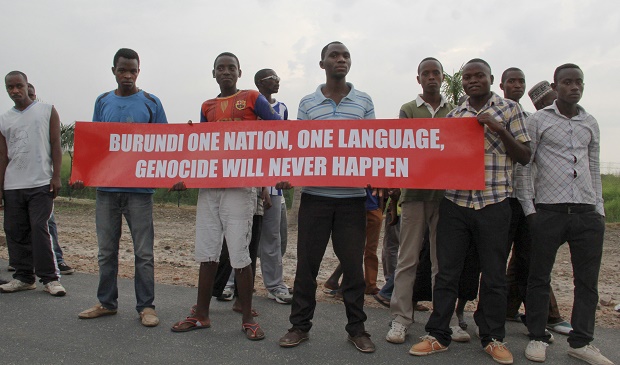
Young men hold a banner on the road that the convoy of the United Nations Security Council delegation took, in Bujumbura, Burundi Thursday, Jan. 21, 2016. A delegation of the U.N. Security Council arrived in Burundi Thursday to try to help end political unrest that has sparked deadly violence. AP Photo
BUJUMBURA, Burundi—At least one person was killed as gunfire and explosions rocked the Burundi capital Thursday evening, a local official and witnesses said, just as a UN Security Council delegation arrived to push for an end to months of political unrest.
READ: UN Security Council condemns Burundi attacks, urges peace
One youth was shot dead by police after a grenade went off in Bujumbura’s northeastern Mutakura area, a local administrative source said, adding that a second person was injured by gun shots. The information was confirmed by several witnesses.
Explosions and gunfire were also heard between 6:30 p.m. and 8:00 p.m. (1630-1800 GMT) in the central Bwiza district, in southern Musaga neighbourhood and in the north of the city, residents said.
The unrest erupted shortly after UN Security Council ambassadors landed in Bujumbura to push the government to hold serious talks with the opposition and accept peacekeepers.
READ: UN chief warns that Burundi is on the brink of civil war
The delegation is seeking an end to the violence that has gripped the country since last April, when President Pierre Nkurunziza’s announced his ultimately successful re-election bid.
Upon arrival Thursday, the UN team was greeted by hundreds of protesters backing the government, carrying signs in English that said “genocide will not happen” and “stop interfering in Burundian affairs.”
At a meeting planned for Friday, the council hopes to persuade Nkurunziza to agree to an African Union proposal of 5,000 peacekeepers, which his government has branded an “invasion force.”
AU Commission chief Nkosazana Dlamini-Zuma expressed “the fervent hope” that the UNSC ambassadors will “contribute toward achieving” the rapid deployment of the peacekeepers and the “immediate resumption of the inter-Burundian dialogue”, in reference to stalled talks between the government and opposition.
Two former Burundian presidents also appealed to the UNSC to take action and pleaded for an AU force to be sent to the country.
“We really need that force,” said Domitien Ndayizeye, who led the landlocked nation from 2003-2005.
The UN must “stop this bloodletting that is making our young people disappear,” added Jean-Baptiste Bagaza, in power from 1976-1987.
Discussion of the peacekeeper deployment is expected to be a key element of talks at the AU summit in Ethiopia on January 30-31.
An AU deadline for Burundi to accept the force has long passed with no action yet taken to deploy the peacekeepers, named the African Prevention and Protection Mission in Burundi (MAPROBU).
Tensions with Rwanda
But the protesters who had been waiting for the diplomats in the capital made clear their opposition.
“Rwanda, stop Burundian refugees’ military recruitment,” another protest sign read.
Relations between Rwanda and neighbouring Burundi are tense, with Bujumbura accusing Kigali of backing armed rebels and political opponents of Nkurunziza. Rwanda has denied all the claims.
Burundi descended into bloodshed in April when Nkurunziza announced his intention to run for a controversial third term, which he went on to win in July elections.
More than 400 people have died and at least 230,000 have fled to neighbouring countries. The UN has warned that the violence could escalate into ethnic killings and mass atrocities.
Hours before the UN diplomats arrived, Burundian rebels named a fugitive ex-general who fled after leading a failed coup bid last May as their leader.
Ex-general Godefroid Niyombare, a former intelligence chief, is the leader of the Forebu rebels, said spokesman Edward Nibigira, himself a former senior police general.
The rebel force, which announced its formation in December after months of unrest and bloodshed in the troubled central African country, calls itself the Republican Forces of Burundi, or “Forebu” after its French acronym.
The rebels formed the force “to protect the population” and uphold the Arusha Agreement that paved the way to the end of the 1993-2006 civil war but which they say Nkurunziza violated by running for, and winning, a third term.